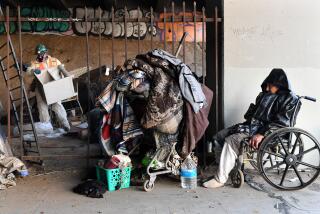Residency Bids Are Rejected
- Share via
HONG KONG — In an emotion-charged judgment, Hong Kong’s highest court rejected Thursday the appeal of nearly 5,000 mainland Chinese fighting for the right to live with their parents, who are permanent residents of the special administrative region.
The court, however, ruled that between 200 and 300 others involved in the case could stay. They include mainland Chinese who had applied for Hong Kong residency before the territory’s return to China in July 1997 or who had disregarded the regional government’s advice to hold off on filing for the status and thus established an early record of their intent.
Tensions outside the Court of Final Appeal building in central Hong Kong ran high, and police presence was heavy. Some of those involved in the case ran sobbing from the court and sought refuge in a nearby church. Many said they would refuse to comply.
“Win or lose, I’m not allowing my daughter to go back” to mainland China, said garment industry worker Yin Wai-kam, clutching the hand of her 21-year-old daughter, Fong Cho-kwan. “She is handicapped and needs special attention.”
Franco Mella, a Roman Catholic priest who has helped residency seekers throughout their legal battle, worked to calm those who wept uncontrollably after the verdict.
“We will meet with the government and seek administrative relief,” he said. “This isn’t over.”
Most of those rejected were born on the mainland to parents who then moved to Hong Kong and became permanent residents here during the British colonial era, leaving the children behind with their families.
Human rights activists and lawyers for those seeking residency condemned the ruling as unfair and arbitrary. Some claimed that it constituted a dangerous weakening of the territory’s judicial independence, although others disagreed.
Hong Kong Chief Executive Tung Chee-hwa announced that those affected by the judgment would have until the end of March to return to the mainland and called on them to accept the ruling.
“The court has made a clear decision,” he said. “I hope all those affected will accept it.”
Thursday’s ruling appeared to bring an end to one of Hong Kong’s bitterest, most controversial legal battles. After a three-year struggle, Hong Kong’s government managed to defend an immigration policy so stringent that it blocks entry to the sons and daughters of many residents. But the cost of victory was high.
In August 2000, a group of emotionally exhausted applicants involved in the case set fire to the 13th floor offices of the territory’s Department of Immigration, leaving two people dead, 50 injured and the local community in shock.
With a huge disparity of income between affluent Hong Kong and the poorer mainland, government authorities argue that only a tough immigration policy can prevent the territory from being inundated with newcomers. The policy enjoys broad public support here.
Lawyers for the losing side complained that the ruling discriminated against those who had accepted government assurances in late 1998 that applicants need not take any steps until an existing case on the right-of-abode issue was decided in the courts. Those assurances came as the territory’s legal assistance system was being overwhelmed by those seeking residency.
Thursday, however, those who had ignored the government’s advice won the day because their individual actions had generated an early record of intent to claim residency. The losers were those who accepted the government’s assurances or took their first legal steps only months later by joining the case decided Thursday.
“It’s difficult to envision a case where there has been a more grievous injustice than this,” said attorney Peter Barnes, who represented 43 of those involved in the court action. “Those who ignored the government’s advice are all right, and those who obeyed it are left with nothing. What does this say about the people’s belief in government?”
At a news conference Thursday evening, Hong Kong’s secretary for security, Regina Ip, said the government had no remorse about its advice.
Some legal specialists said Thursday’s judgment did far more than dent the government’s credibility, arguing that it weakened the independence of Hong Kong’s judiciary. That independence was already tarnished by Beijing’s decision to overrule a January 1999 decision by the Court of Final Appeal that gave the right of abode to any child of a Hong Kong permanent resident.
Thursday’s judgment in effect endorsed the tough position taken by Beijing when the Communist government “reinterpreted” the 1999 ruling.
Under the “one country, two systems” formula applied to Hong Kong when it reverted to Chinese sovereignty, the former British colony retained many of the rights of a democratic society, including a supposedly independent judiciary.
“We knew that [Beijing] had the power of reinterpretation, but until today, we haven’t known the extent to which judgments are affected,” Barnes said.
Others, however, claimed that although the judgment favored the government, it also contained more language aimed at protecting the principle that the court’s rulings are final.
Hong Kong-based social scientist Michael DeGolyer likened the judgment to the historic U.S. Supreme Court case of Marbury vs. Madison in the early 19th century. In that case, the court sided with the government, but in the process it established the principle of judicial review that elevated the court to the force it remains today.
More to Read
Sign up for Essential California
The most important California stories and recommendations in your inbox every morning.
You may occasionally receive promotional content from the Los Angeles Times.










